Dog Breeders the Impact On Our Dogs
How Breeders impact our Dogs Behaviour and Health
Part 1 The First Eight Weeks
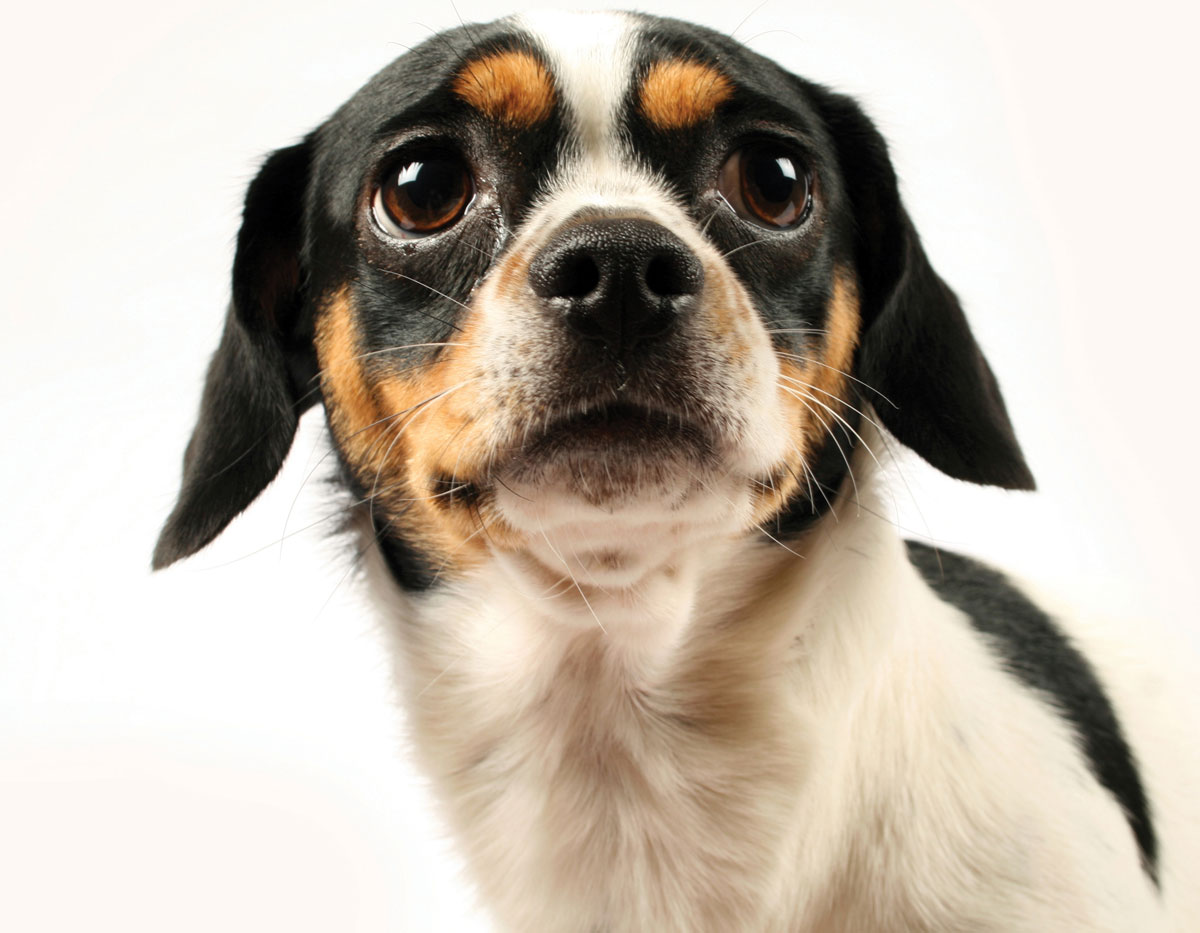
It referred to the first years of a human’s life. They claimed these are the most vitally important learning periods in any human’s lifetime.
Science and psychology now tend to lean towards the first five to five and a half years being the critical time period.
These are the most critically important period in the formation of a young child’s personality, character, intelligence and abilities.
We are all aware that when children are born they are virtually helpless.
Within five to five and a half years they are a vastly different individual. With a fully formed personality, the ability to communicate, understand boundaries and make decisions based on knowledge and experience.
Under-fives find it very difficult to understand boundaries; negotiation is not part of their repertoire. You have more chance of negotiating with a terrorist than you have with your young toddler.
Something appears to happen at five + years. They suddenly understand what it is right and what is intrinsically wrong. It is like a light switch has been thrown.
Dogs get the same thing, though in a different timeframe. That critical timeframe is sixteen weeks. First, let me get rid of an old chestnut. Dogs do not age in seven-year periods, in relation to humans. In reality, it is fifteen for the first year, ten for the second, and four for every year thereafter. Even that is not exact, but it is the closest you will get without looking at breed-specific ageing charts.
The one-year-old dog is not a sweet seven-year-old child. He or she is a 15-year-old Kevin or Waynetta round the back of the bike shed having a quick fag, all spots, and attitude. They are armed with the firm belief that you know literally nothing, and they know everything. If you do your calculations then 16 weeks comes around the five-year-old mark in human years.
The first sixteen weeks of a Puppies life are so vitally important, as to overshadow almost any other considerations. Socialisation and handling from day one is an absolute must to create what I can only describe as the perfect dog. See my two articles (1) Critical Periods Part 1 and (2) Critical Periods Part 2

The Blame Game: I am always being quoted the Mantra. “No Bad Dogs Only Bad Owners” Coined by the late Barbara Woodhouse.
That is probably the most dangerous and inaccurate statement about dogs and their owners, ever written.
I see many good owners with bad dogs and bad owners with good dogs.
There are numerous reasons why we end with dogs with behavioural, aggression and health issues. including what I believe are one of the biggest culprits.The Breeders.
That includes crossbreeds and pedigrees. Other people that have an impact include owners, trainers, behaviourists, and especially vets.
Then we have the amateur experts on the numerous doggy forums. Their advice in some instances can be frankly dangerous and are often totally wrong. There are some forums that are helpful and not antagonistic, but I am afraid to say they are in the minority.
The majority f these armchair experts only knowledge is that they have owned a dog or dogs. Most of them are only there because their dog was a nightmare. Do you really want to take advice from them?
The Owners: Then there are the owners. Who obviously have a major impact on the eventual outcome of their dogs. Having said that It is my firm belief that it is the breeders that can have the main impact on the end results of some if not many of modern dogs.
If the owners do their research, pick the right breed for their circumstances. Then pick the right breeder for that breed. Then they are more than halfway to owning the dog that they can be happy, comfortable and satisfied with.
See a link below to an article I have written about choosing a dog.
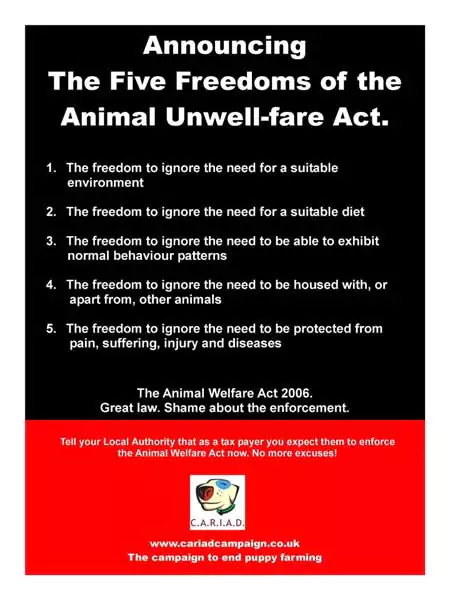
The Breeders: So let’s start at the very beginning. I believe the breeders play the most important role in the outcome of your new puppy. Even before the pups are born, the breeder impacts the end result in numerous ways.
These include the choice of the sire and dam, their health and behaviour, and their temperament, which determines the breeds or crossbreeds they are creating.
I see many genetic problems in dogs that have been caused by the breeder. They include behaviour, health issues, anxiety, aggression and genetic abnormalities.
Let me mention a few examples, Show Cocker Spaniels, prone to Resource Guarding. Labradors, Hip Problems. Bull Terriers, Tail Chasing.
British Bulldogs, Overall Health Issues. Collies, OCD. German Shepherds, Fear Aggression, and Hip Problems, Cavalier King Charles Spaniels, Syringomyelia. Poodles, Eye Problems.
I could fill this article with the many complications and hereditary conditions, our dogs have consistently had bred into them. And the ones stated above are just the Pedigrees.
Fortunately, many of the Pedigree Breeders are constantly working to eradicate these problems. What about the latest craze for so-called designer dogs?
Cross a Labrador with a Poodle and you get a Labradoodle. However, you also get a dog with both hip and eye problem. Cross a Collie with a German Shepherd and you get fear aggression, hip problems and also OCD.
I do not believe people consider that when choosing these crossbreeds. At least with the Pedigree, you are aware of the behavioural, temperament, and health concerns with that particular breed. The other problem is the drives in these dogs. You cross between hunting and guarding breeds and you could have a monster on your hands
Some breeders know they are creating genetic problems. I believe these type of breeders, often care more about the profit they will make than the health or well-being of the dogs Those choices could and often do, have a massive effect on many ongoing generations of dogs.
That is probably more relevant in this latest update. Though I wrote this in 2013 I update all my articles regularly and this update is in February 2021. We are in the middle of a lockdown because of coronavirus, This has caused an enormous spike in demand for dogs and puppies as people crave company.
The cost of dogs has increased by over 250% Supply and demand has fueled this Tsunami and has seen every back street breeder erupt into the dog breeding world, many with no experience and even less knowledge than ever before.
Over the last 12 months, I have seen many horror stories of puppies been sold out the back of white vans for upwards of £2000. No papers and many under 6 weeks of age. It is illegal to sell a puppy under 8 weeks of age in the UK.
I have had puppies brought into my Dog Store in Hampton Hill that cannot even walk they are so young, If they are taken away from their mother before 7 weeks it always has some detrimental effect on that puppy as the mother has not had time to teach the puppies respect and discipline.
Please please remember that these dogs can live for 15+ years. They can and some will be a burden rather than a joy. Do your homework and never ever buy a puppy without seeing the mother and the rest of the litter. Think long and hard about buying a puppy during lockdown because of the inability to socialise it correctly. See my link at the bottom of the page Part 2 The First Sixteen Weeks.
When this pandemic is all over these expensive puppies will be filling the rescue centres with unwanted dogs the rescue centres are gearing up for it now. Many will have serious behavioural problems because it was not possible to socialise and mix them properly in the initial critical periods.
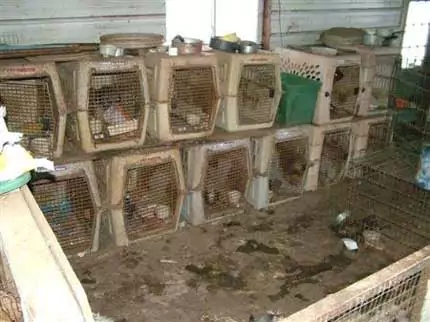
Puppy Farms: The very worst culprits of knowingly creating problems are the puppy farms.
Look at the picture right. Would you buy a puppy from here?
This could be what you get if you buy a puppy without seeing the mother, or from ads or the internet and pet shops.
Puppy farms in the UK have been found to have as many as 200 breeding dogs, most kept locked inside 24 hours a day, often in complete darkness.
They are usually located on farms in barns, chicken houses, garages or any disused outbuilding.
The dogs are forced to eat, sleep and give birth in the same area they urinate and defecate; something dogs would never do given the choice.
In some cases, they are treated far worse than animals bred for the food chain. The general public keeps up the demand for pups and so the cruelty continues Day after miserable day. These puppy farms are most common in Wales and Ireland
The puppies they produce are generally sold in pet shops all over the UK and through newspaper ads and the internet. It is estimated that 50,000 trafficked puppies are believed to be imported from just Ireland alone each year. Most of these are destined for pet shops in Southern England. Just one county, Carmarthenshire in Wales, is thought to produce 28,000 puppies a year also destined for the pet trade in England.
However, what is happening during the lockdown is not that much better, ignorance and greed are in some cases driving the breeding from unsuitable parents and inherent health and behaviour health problems on the back of the god of profit.
Commercial Breeders: This will not make me popular, but I am not a fan of commercial breeders. Where money is the main reason for breeding, then the health and behaviour of the puppies may not be uppermost in their minds.
I feel that in many cases commercial requirements can override ethical issues, be it pedigree or crossbreed. In fact, some of the worst are crossbreeds, and especially Labradoodles. In this case, to keep the price artificially high they are neutering them at six weeks of age.
It is my belief that Vets should be struck off for performing major surgery on these young pups without a serious medical reason. The Labradoodles breeders are not the only culprits charging ridiculous prices for crossbreeds. I recently re-homed a Chug, a Chihuahua and Pug cross.
They had paid eighteen hundred pounds for it at Harrods and then work took them back to their home country where dogs were not overly welcome. So I re-homed it for them. The new owners got it for free. I do not charge for rehoming dogs.
In reality, it was a hybrid. Like the other expensive designer crossbreeds. However, I accept that beauty is in the eye of the beholder. I have just read that Harrods is closing down its pet shop. That means no more sales of puppies possibly from dubious backgrounds. This was great news for me. I do not care how prestigious a shop is. Pups should never be sold in this way.
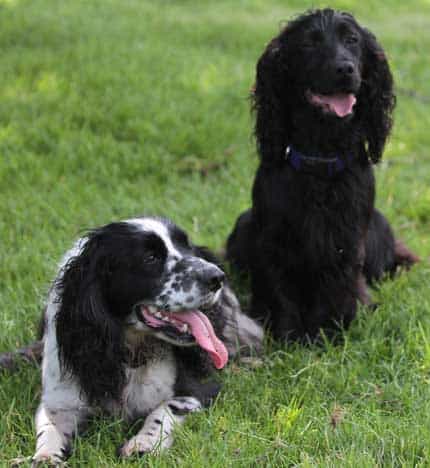
Show Breeders: Some of the show breeders are also breeding dogs with known faults. Fortunately, this is very much in the minority.
I have seen and heard of what can only be described as horror stories of dogs coming from the show and pedigree breeding fraternity.
One would imagine because someone has had a winner or placed in Crufts, that they would understand the requirements of breeding a good dog, both mentally and physically.
In some cases, this could not be further from the truth. To some show breeders, their dogs are just there for reflected glory.
I believe in some cases they do not even seem to like dogs. Buyers should be careful from any breeder they buy from, whether show or otherwise.
Some of the worst socialised dogs I have ever seen have come from show cast-offs. These are dogs normally over six-month-old, which the breeder held back because they showed potential as a pup to be a winner in the show ring.
They either grew too big, or had other defects, and were surplus to requirements. These can sometimes be the worst behaved dogs I have ever had the misfortune to treat.
Some are fearful, anxious, nervous, and often aggressive. With many behavioural and psychological hang-ups, many are traffic aversive and had never been exercised or desensitised to everyday life.
This I believe that some show breeders do not have a clue about the importance of early socialisation. Having said that, many that I have met are brilliant show breeders, and there are many great dog lovers in the show World who do have the breed and the dog’s welfare and behaviour, as the most important outcome for their litters.
Many check the credentials of the buyers and if they do not like what they hear or see they refuse to sell the pups. These are the ones I would go too. I would love to say that was the mindset of all of them, but that is sadly not the case. I believe breeders should study the importance of the critical periods in a puppy’s psychological growth. This is especially true of the first eight weeks.
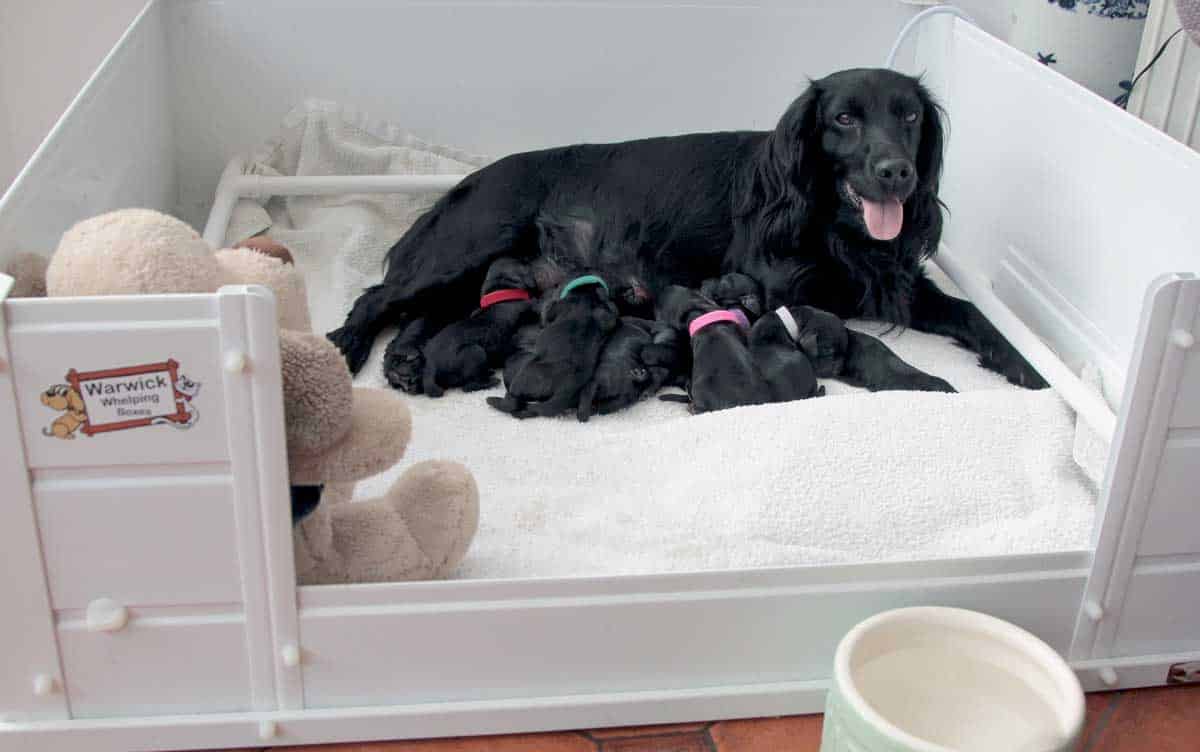
The First Weeks: if the breeders have bred the best pair of a dog they can get, with the best temperament and health scores. Then that is a very good start, but only the beginning.
They will still have a massive impact on the outcome of those puppies by their actions until the puppies go to their new homes
The picture on the left is Fizz with her seven puppies at one-day-old look how healthy they all look and more importantly how healthy the mother looks after just given birth.
This was my only litter of puppies I have ever bred and I had over 200 people including lots of children handling them before they went to their new homes the sire is in the picture above the litter his name is Jet I own him and the other in the picture Guinness.
The only senses these pups have when they are born are touch, smell and taste. Puppies navigate by smell from the moment they are born their eyes are closed and their hearing has not yet developed.
Humans handling pups from day one provide a mild stress response, which acts to improve the puppies both physically and emotionally. After that at 10 to 14 days the sense of hearing and smell develops fully, eyes open and the teeth begin to appear.
Their eyesight is not fully formed until six weeks. Though they can see enough to get around from three weeks of age. Pups that are handled regularly during the first seven/eight weeks of their life mature and grow quicker. They are more resistant to infections and diseases and are generally more stable.
These pups handle stress better, are more exploratory, curious and learn much faster than pups that are not handled during this period. They are also more likely to be happy around humans and are rarely aggressive. Therefore, the pups born in kennels outside, and not in the home, and the ones born into puppy farms are less likely to get this vitally important tactile input.
It is important that the puppy stays with the mother for at least seven weeks. It is during these first important weeks that the puppies learn respect, and the ability to learn the all-important social graces of the dogs and human world. The breeder should be introducing the puppies to other people males and females and children as much as possible and handling should be daily. I find many breeders do not socialise their dogs enough during this vitally important time.
This bears repeating Many dogs that are rehomed very late, especially from show breeders, mainly because the pups do not grow into the size or configuration compatible with that particular breed’s standard have behavioural problems.
These dogs can be nervous and very badly socialised, with both humans and dogs that do not form part of their own pack/family. If that dog is over sixteen weeks of age when you purchase it, then what you see is basically what you will get for the remainder of that dog’s life, without professional help or intervention.
If the breeders choose the sire and dam correctly and breed from the very best they can find, following the simple rules of handling and socialising. Then it is up to the new owners to take over the reins, for the next eight weeks until the crucial sixteen-week period. And to end up with the perfect dog you will need to read part two which is called The First Sixteen Weeks see below to sixteen weeks.
© Stan Rawlinson December 2013
Upgraded regularly the last upgrade Feb 2021
Other reading
Part 2 The First Sixteen Weeks
Designer Dog Breeds Good or Bad?
Pregnancy and Countdown to Birth
My thanks to Puppy Love Campaigns For their information on puppy farms
I also support CARIAD. Care and Respect should Include All Dogs







Comments (2)
Helping Brian
Thank you so much for this, I have learned such a lot from you and now you have confirmed that the problem with my dog Brian is mostly down to breeding! I got my dog not knowing that he was puppy farmed (I have proof) . I can tell you that not all puppy farms are as you describe. This “breeder” invites you into their home, all of her dogs seem to love her, you get to meet the parents etc.
I and many others have been fooled by this breeder including a very famous person who most likely is still unaware. My dog has had aggression issues since we got him, I was foolish enough to think that given time he would grow out of it! He is a loving lovely little dog apart from one thing. Most of the time he gets on fine with other dogs, behaves appropriately but if he perceives another dog as being a threat he goes into attack mode, for example, if a dog asks him to give them space by growling he will go into attack mode. Stan, how I wish I had had access to you because you would have been my first point of call. We have tried our very best and although thing have improved, the tendency is still there, we must be doing something wrong.. His health is fine, he is raw fed, only had puppy vaccinations, definitely no L2 or L4, no toxic wormers. He hasn’t been neutered for all the reasons you mention. We do ask ourselves if neutering might help but cannot risk taking this step without sound advice. Unfortunately there doesn’t seem to be anyone out there who can give that advice. Today I will order the Jingler which I probably should have done ages ago although I’m not sure how this would work for him, I don’t want to get the timing wrong. One thing’s for sure I won’t give up on him, he deserves a better life. Thank you for reading this and allowing me to get it off my chest and thank you for your e-mails, they are most helpful
Brian Jingler question
Hi again,
I have just had a look at the reasons for using a jingler and still not sure if we fall into that category. Brian walks quite well on the lead, we have no problem on the lead only if he goes into the attack mode. I am still not sure if it would be appropriate for us to try the jingler for his problem? I would be so very grateful for your advice before I purchase one.
Best wishes
Sharon
Comments are closed.